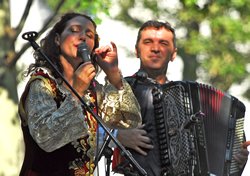Reconstruction and Reconciliation concludes SU's Ray Smith Symposium March 24-25
Symposium addresses healing power of music amid violence, mass instability

The Ray Smith Symposium in Syracuse University’s College of Arts and Sciences concludes its yearlong examination of “Music of Conflict and Reconciliation” with a two-day program titled “Reconstruction and Reconciliation.”
Events include a symposium, featuring ethnomusicologists Jane Sugarman (CUNY Graduate Center) and Gregory Barz (Vanderbilt University), on Thursday, March 24, at 7:30 p.m. in Kittredge Auditorium in Huntington Beard Crouse Hall, and a Mini Seminar with Sugarman and Barz on Friday, March 25, from 9 a.m.-12:30 p.m. in The SU Humanities Center Seminar (room 304) in the Tolley Building. Activities continue on March 25 at 8 p.m. in Shemin Auditorium in the Shaffer Art Building with a program titled “Sounds of Tradition and Renewal,” featuring Barz’s documentary “Inanga: A Song of Survival in a Daughter's Rwanda,” followed by performances by SU guitarist Ken Meyer and by Albanian musicians Merita Halili and Raif Hyseni (above).
“Transitional justice is a field of inquiry in its own right, with almost as much attention being paid to the study of acts of violence as to the study of what happens afterward,” says Theo Cateforis, event organizer and assistant professor of art and music histories. “We will look at how music rises above conflict and mass instability to bring opposing groups of people together.”
An ethnomusicologist whose work focuses on music and identity formation within Albanian communities, Sugarman has a strong background in South Slavic, Turkish and Arabic music. She is particularly known for her scholarship on music and gender, including the book “Engendering Song: Singing and Subjectivity at Prespa Albanian Weddings” (University of Chicago Press, 1997), which was awarded the Chicago Folklore Prize by the American Folklore Society. Her symposium presentation is titled “With Microphone in Hand: Popular Music, Social Activism and the Performance of Westernness in Postwar Kosova.”
Barz is a pioneer in the growing field of medical ethnomusicology. An ethnomusicologist with faculty affiliations in religion and African American studies, he is the author of “Singing for Life: HIV/AIDS and Music in Uganda” (Routledge, 2005), which draws on case studies, song texts, interviews and personal testimonies to depict the healing power of music. His symposium presentation is titled “Songs of Unity and Reconciliation in Post-Genocide Rwanda.”
On Thursday, Sugarman and Barz will be joined by two respondents. Beverly Allen, professor of French, Italian and comparative literature at SU and author of “Rape Warfare” (University of Minnesota Press, 1996), will address Sugarman’s presentation. David Mwambari G’10, visiting assistant professor of sociology and international relations at Shawnee State University, and co-founder of Sanejo, an organization devoted to promoting education in post-conflict countries, will respond to Barz’s presentation.
Activities continue on Friday with a performance by Meyer, assistant professor of music in SU’s College of Visual of Performing Arts, and by Malili and Hyseni, one of the most popular Albanian musical duos in the country. “They will present masterful interpretations of traditional and contemporary folk songs from Albania and the Republic of Kosova,” says Cateforis of the husband-and-wife team, which has performed at the Lincoln and Kennedy centers.
More information about the entire program, which is free and open to the public, is available by calling (315) 443-4184.
“Reconstruction and Reconciliation” is organized and presented by the Department of Art and Music Histories, with major funding and assistance provided by The Mellon CNY Humanities Corridor, an Andrew W. Mellon Foundation initiative, and The SU Humanities Center. The Mini Seminar is sponsored by The SU Humanities Center.
Media Contact
Rob Enslin
